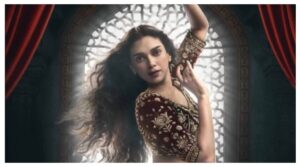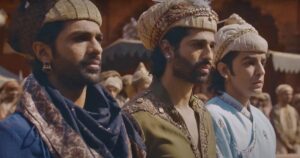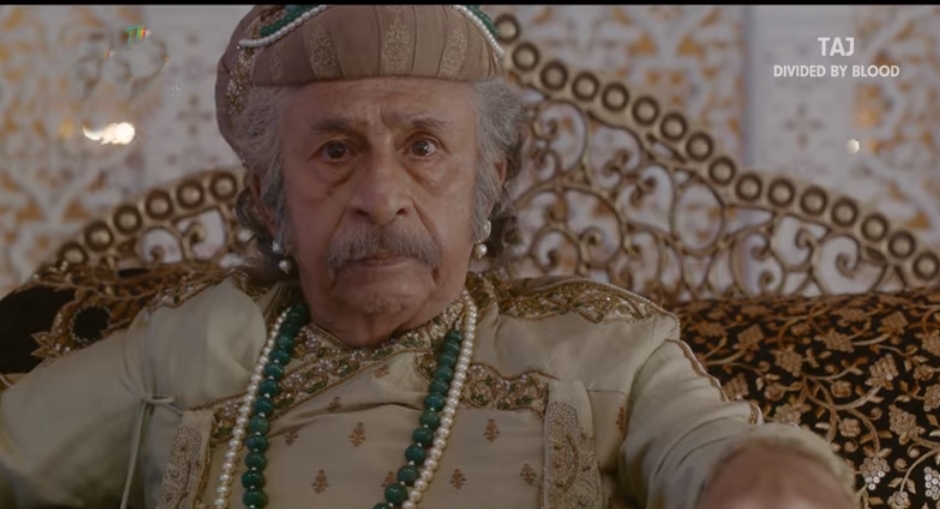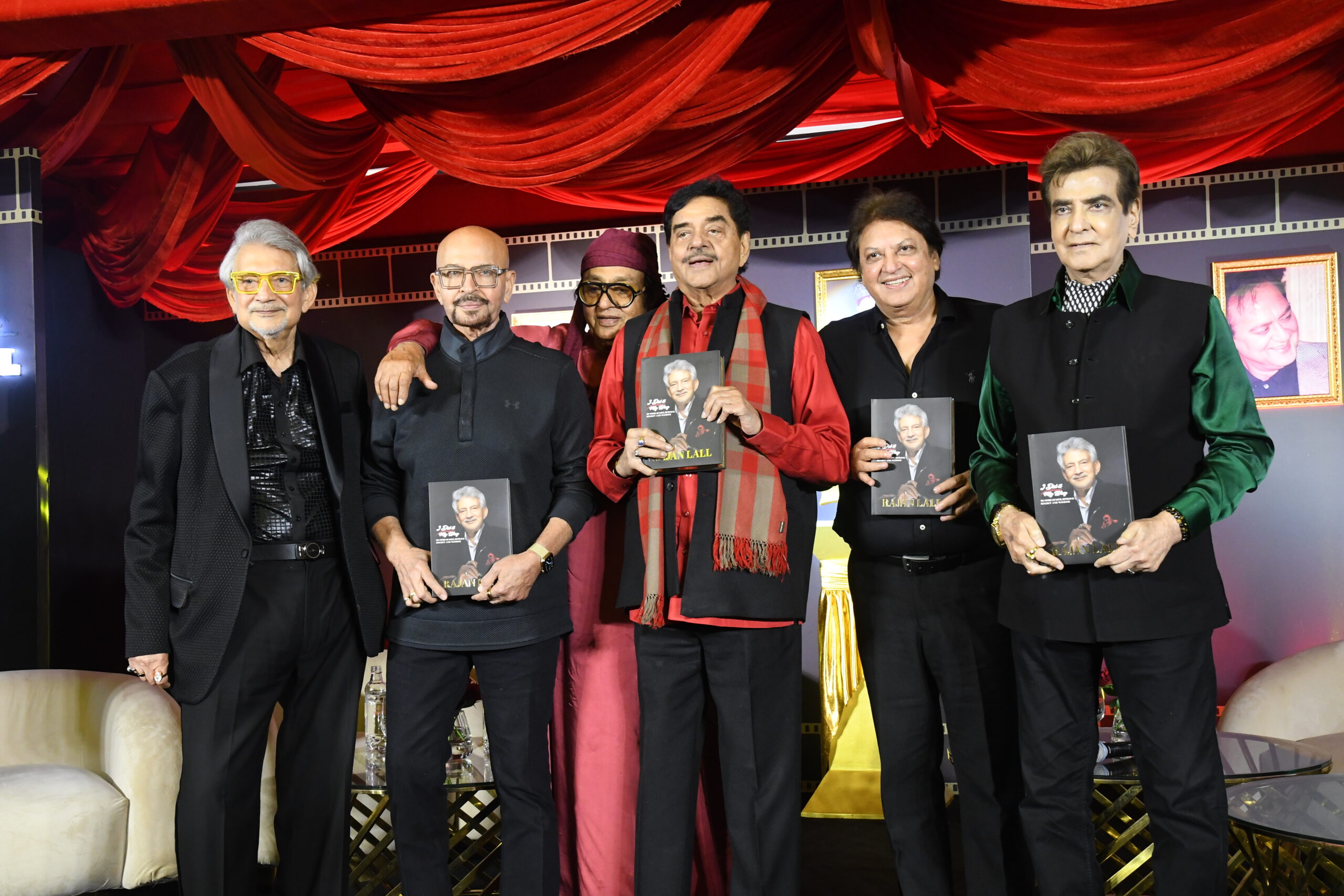‘Uneasy lies the head that wears the crown,’ for this Akbar, played by the. veteran Naseeruddin Shah, in Zee 5’s epic series ” Taj: Divided by Blood. The series, places itself in the era of Akbar’s life where he is a father to three young sons, all of who, are vying for the throne. He decrees that the worthiest of them will be given the throne and it won’t necessarily go to the first born, as is norm. This places the three princes Salim, Daniyal and Murad in constant conflict with each other.

Like a giant chess-board and a fervent chess game in action, the series reveals the secrets of the royal family, the king, the queens, power hungry courtiers, the bigots, the fundamentalists, who use the dancing girls, the eunuchs, the slaves, as pawns and informers to further their devious designs. Sexacapades, adultery, masked assassins, spies, nautch girls add drama to the series.
It starts with a young Akbar (with the voice of Naseer) visit the abode of sufi saint and mentor Shaikh Salim Chisti ( whose dargah adorns Fatehpur Sikri even today). The veteran actor Dharmendra plays the saint who oracles that Akbar will be blessed with three sons but will be mired in the ruses of his own blood.
True enough, the prophecy turns true. Salim, born to his Rajput wife Jodha, while Daniyal ( whose mother is not mentioned) and Murad, born of one of Akbar’s many wives. The three princes have distinctly different personalities. Salim is the pleasure seeker – always in the company of women and alcohol.The effeminate but devout Daniyal is gentler than his brothers but vulnerable while Murad is hyper masculine, ambitious, easily angered and impatient warrior.

Ashim Gulati as the pleasure seeking Salim has a natural regal air about him and is the more humane of the three. He usually also plays referee when Murad, played by Dubai raised Tahaa, Shah attacks Daniyal, played by Shubham Kumar Mehra.There’s love and hate between the brothers. They don’t depend on each other but on their own set of friends and cunning advisors – each of whom wants to use them to wield power to the throne. Daniyal’s secret affair with his aide Vivaan makes him an easy target for hate and homophobia.
The filmic representation of the Mughal era, sadly to most of us, is in the image of the latest popular film or series we have seen – Ashutosh Gowriker’s ‘Jodha-Akbar,’ where Hrithik Roshan and Aishwarya Rai played Akbar and Jodha, or the brooding classical Mughal-e Azam with the sonorous Prithviraj Kapoor, brooding Dilip Kumar and the enchanting Madhubala. This series does away with such moonings and focusses on the court politics, ruses, schemes, fight for power and an ageing monarch trying to hold it all together.
The women of the zenana wield power from the harem. They join hands and are at loggerheads depending on where the tide turns. Veteran actor Zarina Wahab, plays one of Akbar’s wives, Salima Sultan Begum, the wise older queen while Padma Damodaran as Ruqaiya Sultan Begum is political minded and Sandhya Mridul plays Jodha Bai, his Rajput wife who blends compassion and control. She makes a mark in a rather demure but strong role and so does Taaha Shah as Murad. He is sharp, agile and his kohl lined eyes accentuate his character of an impulsive warrior.
Rahul Bose plays Naseer’s brother in the series while Aditi Rao Hydari plays the famed beauty and courtesan Anarkali. Her disinterest towards Akbar and love towards Salim is evidently portrayed. Her ultimate rebellion comes in the form of falling in love with Prince Salim and inviting Akbar’s wrath and ire. The scene where she is buried alive is strangely unmoving and non-dramatic.
The master, Naseer wears a disturbed and worried expression throughout the series. There are little moments of respite for the Emperor who bears the burden of ruling his country and then leaving it to a capable heir. We see a lonely man who is emotionally abandoned by his sons, his courtiers and the love of his life – the courtesan Anarkali, who has a torrid love affair with his eldest son Salim.
The series is directed by Ron Scalpello, written by Christopher Butera, William Brothwick, Simon Fantauzzo and has no moments of relief despite Birbal being part of the scenes. The famed Akbar-Birbal exchange of wits could have been a possible respite. The series reveals a secret about Anarkali, that popular Hindi cinema has hardly addressed. Also, some of its characters don’t seem to shed away their urbane -ness to adapt to an essentially “period” series. Naseer stands out effortlessly in this series wearing his role of the emperor. He is not the over-sure monarach but someone who is constantly judging his successors, who he thinks are still unworthy.
Though history has it that Salim who was later known as Jahangir ascended the Mughal throne after Akbar, this epic tale is a good watch and leaves you with a sense of incompleteness. A feeling of ‘to be continued…’





